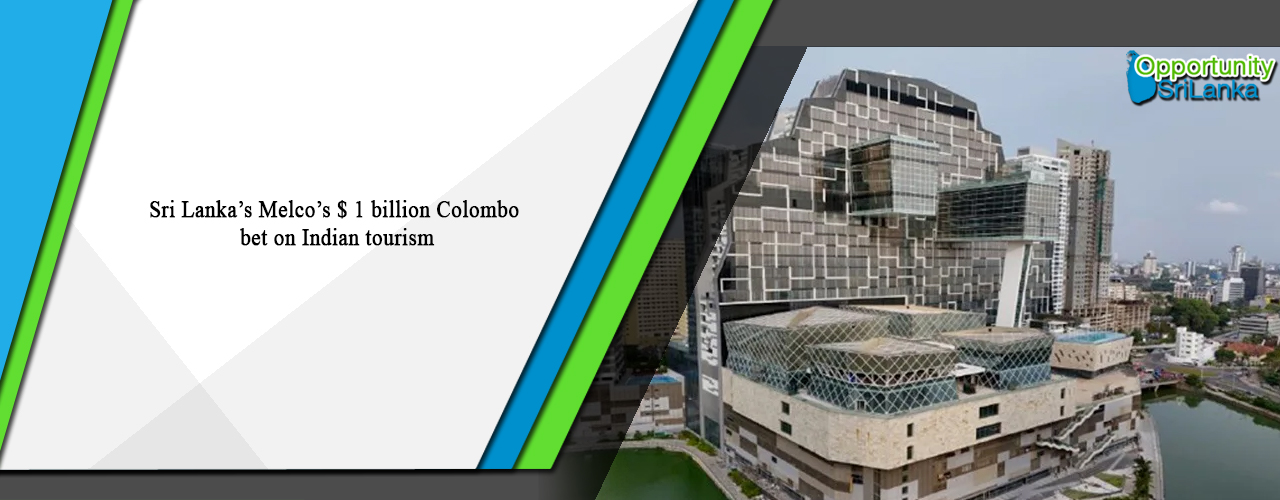Sri Lanka’s Melco’s $ 1 billion Colombo bet on Indian tourism
The Morning: Melco Resorts and Entertainment’s new ‘City of Dreams Sri Lanka’ project in central Colombo could benefit from wealth and outbound tourism from India, with its casino possibly helping to generate around 50% of the property’s EBITDA, brokerage Morgan Stanley predicts.
This year Melco Resorts announced a joint venture with John Keells Holdings PLC, the largest conglomerate listed on the Colombo Stock Exchange, to include a casino in an integrated resort project located in Sri Lanka’s capital, with an investment exceeding $ 1 billion.
During the group’s first-quarter results conference call, Melco executives expressed confidence in the $ 125 million investment into the venture, considering it a “small wager” with the prospect of substantial returns.
After discussing the project with John Keells, Morgan Stanley analysts issued a dispatch with key takeaways, which describes the potential of the Indian tourism market and the property’s profitability.
Data cited by the dispatch show that tourism in Sri Lanka has seen a rollercoaster journey, with significant disruptions in recent years due to a terror attack in 2019 and the Covid-19 pandemic through to 2023.
However, the market is on a rebound, with tourist visitation peaking at 2.3 million in 2018, of which Indian nationals represented 18%. As of May 2024, visitation levels have recovered to 88% of the 2018 peak, indicating a robust recovery.
Melco’s City of Dreams will be the first integrated resort in South Asia and the development aims to capitalise on the growing interest and financial capability of Indian tourists. However, Morgan Stanley warns that this demographic has traditionally spent less on casinos compared to their Chinese counterparts, as observed in markets like Singapore.
The group’s investment is substantial, with a planned expenditure of $ 125 million for fitting out the gaming space, set to commence this year. The company has secured an independent 20-year gaming license, marking a long-term commitment to the Sri Lankan market.
According to Morgan Stanley, the partnership with John Keells, a veteran in the leisure and hospitality industry – with its Cinnamon brand operating around 2,500 rooms across Sri Lanka and the Maldives, is a cornerstone of this venture.
Under the agreement, Melco will operate the around 180,000 square-foot casino and manage 113 ‘Nuwa’ ultra-high-end hotel rooms.
“Financial arrangements dictate that Melco will receive EBITDA from the gaming operations after remitting 50-55% to John Keells and paying a subsequent 30-40% income tax on the remainder. Additionally, Melco will earn management fees for the Nuwa hotel operations,” Morgan Stanley analysts pointed out.
The commercial space of the City of Dreams is already open, with the majority of hotel rooms scheduled to open in October this year. The casino is anticipated to commence operations by mid-2025.
John Keells has invested $ 900 million into the project, aiming for a return hurdle rate of 15% ROIC, with an expected cash flow generation of $ 100 million.
For Melco, the financial outlook is promising, with Morgan Stanley estimating that the property casino could generate 50% of the IR’s EBITDA, indicating that returns on the $ 125 million investment could be significant.
OSL take:
Sri Lanka is constantly on the lookout for new concepts to promote the country’s tourism industry, which is on a steady path and has become a key revenue generator to the country. It is in such a backdrop that Sri Lanka is looking at promoting casinos and nightlife tourism to attract high-spending tourists, especially from India. Indian tourists currently form the highest tourist arrivals to the country and local tourism authorities are looking at attracting more high-spenders from India while promoting cultural and religious tourism among Indians. The proposed ‘City of Dreams Sri Lanka’ in Colombo is indicative of the expanding and diverse nature of the country’s tourism industry as well as the evolving business/investment opportunities. Given the interest shown by international leisure and hospitality brands to also do business in Sri Lanka, foreign businesses/investors could confidently explore the expanding opportunities in Sri Lanka’s tourism industry.

